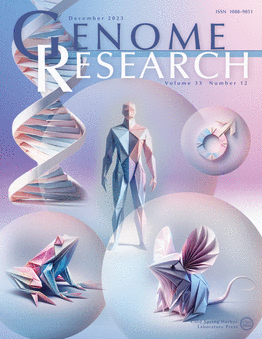通过基因剂量方差重新校准差异基因表达优先考虑功能相关基因
IF 5.5
2区 生物学
Q1 BIOCHEMISTRY & MOLECULAR BIOLOGY
引用次数: 0
摘要
差异表达(DE)分析是一种广泛使用的方法,用于鉴定与观察到的表型或生物反应在功能上相关的基因。然而,典型的DE分析包括基于表达倍数变化阈值的基因选择,隐含的假设是所有基因对其转录物的剂量变化同样敏感。这倾向于支持高度可变的基因,而不是更受限制的基因,即使是表达的微小变化也可能具有生物学相关性。为了解决这一限制,我们开发了一种方法,根据在人群中观察到的遗传表达差异来重新校准每个基因的DE折叠变化。新建立的指标对统计上表达差异的基因进行排名,不是通过名义上的表达变化,而是通过与每个基因的自然剂量变化相比的相对变化。我们将我们的方法应用于体外刺激反应和神经精神疾病实验的RNA测序数据集。与标准方法相比,我们的方法调整了对高度可变基因的发现偏差,并丰富了与代谢和调节活动相关的途径和生物过程,表明了功能相关驱动基因的优先级。组织特异性重新校准增加了对已知疾病相关过程的检测。总之,我们的方法提供了一个关于DE的新观点,并有助于弥合统计和生物学意义之间的现有差距。我们相信这种方法将简化对致病分子过程的识别,并加强对治疗靶点的发现。本文章由计算机程序翻译,如有差异,请以英文原文为准。
Recalibrating differential gene expression by genetic dosage variance prioritizes functionally relevant genes
Differential expression (DE) analysis is a widely used method for identifying genes that are functionally relevant for an observed phenotype or biological response. However, typical DE analysis includes selection of genes based on a threshold of fold change in expression under the implicit assumption that all genes are equally sensitive to dosage changes of their transcripts. This tends to favor highly variable genes over more constrained genes where even small changes in expression may be biologically relevant. To address this limitation, we have developed a method to recalibrate each gene's DE fold change based on genetic expression variance observed in the human population. The newly established metric ranks statistically differentially expressed genes, not by nominal change of expression, but by relative change in comparison to natural dosage variation for each gene. We apply our method to RNA sequencing data sets from in vitro stimulus response and neuropsychiatric disease experiments. Compared to the standard approach, our method adjusts the bias in discovery toward highly variable genes and enriches for pathways and biological processes related to metabolic and regulatory activity, indicating a prioritization of functionally relevant driver genes. Tissue-specific recalibration increases detection of known disease-relevant processes. Altogether, our method provides a novel view on DE and contributes toward bridging the existing gap between statistical and biological significance. We believe that this approach will simplify the identification of disease-causing molecular processes and enhance the discovery of therapeutic targets.
求助全文
通过发布文献求助,成功后即可免费获取论文全文。
去求助
来源期刊

Genome research
生物-生化与分子生物学
CiteScore
12.40
自引率
1.40%
发文量
140
审稿时长
6 months
期刊介绍:
Launched in 1995, Genome Research is an international, continuously published, peer-reviewed journal that focuses on research that provides novel insights into the genome biology of all organisms, including advances in genomic medicine.
Among the topics considered by the journal are genome structure and function, comparative genomics, molecular evolution, genome-scale quantitative and population genetics, proteomics, epigenomics, and systems biology. The journal also features exciting gene discoveries and reports of cutting-edge computational biology and high-throughput methodologies.
New data in these areas are published as research papers, or methods and resource reports that provide novel information on technologies or tools that will be of interest to a broad readership. Complete data sets are presented electronically on the journal''s web site where appropriate. The journal also provides Reviews, Perspectives, and Insight/Outlook articles, which present commentary on the latest advances published both here and elsewhere, placing such progress in its broader biological context.
 求助内容:
求助内容: 应助结果提醒方式:
应助结果提醒方式:


